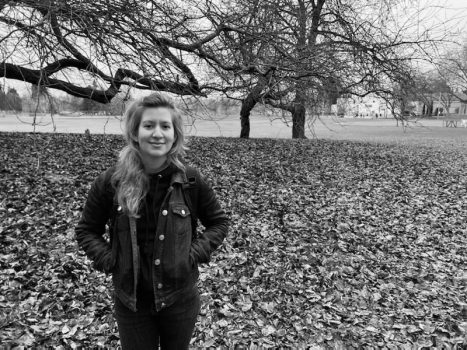 MLIS student Lindsey Schwartz
MLIS student Lindsey SchwartzFrom studying sociology and environmental studies to kneading dough as a baker, Lindsey Schwartz’ varied interests brought her to the University of Washington Information School. Lindsey moved to Seattle from Philadelphia during the COVID-19 pandemic to begin the Masters in Library Information Science (MLIS) program. Before pursuing a professional degree, Lindsey worked at the Historical Society of Pennsylvania in the research services and archives department where she processed collections and guided patrons through on-site resources. She was drawn to the iSchool’s MLIS program because it offered the ability to work with different disciplines across multiple sectors.
Lindsey came to the iSchool with an interest in archival studies and a desire to learn more about information science and library science. The flexibility of the MLIS program has given Lindsey the chance to create her own research path and pursue her interests. An introductory library class resonated with her, particularly when students were encouraged to think about; how knowledge work is valued, why libraries and archives often rely on contingent funding, and why these issues persist. “Because of my social science background, I have the ability to ask questions from a critical perspective,” she says. Flexibility within the iSchool MLIS program enabled Lindsey to tailor coursework to her interests without the limits of a single track.
Researching at TASCHA
Prior to joining TASCHA in the summer of 2020, Lindsey worked on the Open Data Literacy (ODL) project. ODL is a collaborative project at the University of Washington led by iSchool faculty members, Carole Palmer and Nic Weber, in partnership with public institutions that create, manage, and publish open data. Specifically, Lindsey helped with the qualitative analysis of the internship project which informed TASCHA’s Leveraging Use of Open Data by Public Library Staff for Community Benefit project.
The Leveraging Use of Open Data by Public Library Staff project investigated the challenges and opportunities for public library staff to use open data to support effective program, service, and partnership planning. Lindsey built on her ODL experience by assisting the TASCHA research team with qualitative analysis of workshop sessions with public library staff. This analysis, combined with extensive discussions with the project team, informed the next steps of the research beyond the planning grant.
What we heard from the public library staff participating in the workshops was very valuable information related to the challenges and needs of the staff in relation to open data and their communities. Lindsey helped us by synthesizing the huge amount of qualitative information from multiple sessions and was comfortable asking the project team questions about how this might shape the next steps of the project. Lindsey came in at a critical time and helped us to make sure that we critically examined some of our earlier assumptions about possible paths forward, said Chris Jowaisas, co-PI on the project.
While the next steps for the project look different from the initial assumptions in the planning grant proposal, this was another example of how, for Lindsey, research isn’t a linear process. It’s an evolution that often leads to new considerations and opportunities.
I enjoy research because I have persistent questions about very complex issues. I am reassured that my interests are matched by the opportunity to be mentored by people doing work that I think is inspiring or impactful.
Working on the Leveraging Use of Open Data by Public Library Staff for Community Benefit project continued her interest in using tools of the institution to affect something outside of academia.
Continued involvement
During the winter quarter of 2022, Lindsey is assisting Carole Palmer and Chris Coward in organizing a summit on the advancement of LIS research and education in U.S. iSchools. She is also examining, alongside the iSchool’s Nic Weber, policy protections for gig workers, particularly the influence of platform technologies in urban planning and the political implications of data collected “from” platform users. These proprietary data can provide valuable insight to agencies concerned with traffic congestion, carbon emissions, and Vision Zero initiatives, and as a result prompt the question of these companies’ influences in policy-making, as well as issues of management and agency for sensitive data, says Lindsey. We look forward to keeping up with Lindsey and her influential work in the MLIS program.


